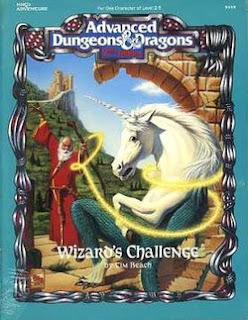Alternate Rules for Spellcasters
In this article, I touch on a couple of tropes that have
been applied to wizards in several series that I have enjoyed over the years
and apply them to Dungeons and Dragons although they could easily adapted to
fit any fantasy-themed campaign. I
touched on Familiars before but I thought I would share some other “House
Rules” that I use in my campaigns.
These rules apply only to Primary Spellcasters (those who receive spells beginning at first level). Secondary casters like Rangers and Paladins do not gain these abilities.
---------------------------------------------------------------------------
Great longevity is a trait that spellcasters in general and wizards in particular are known for.
These rules apply only to Primary Spellcasters (those who receive spells beginning at first level). Secondary casters like Rangers and Paladins do not gain these abilities.
---------------------------------------------------------------------------
Great longevity is a trait that spellcasters in general and wizards in particular are known for.
GAME RULE: Beginning at 10th level in a
Spellcasting Class, the spellcaster adds his caster level to his normal middle
age, old and venerable age categories.
For example, a 10th level Druid would reach middle age at 45
years (instead of 35), old age at 63 years (instead of 53) and venerable at 80
instead of 70. This ability doesn’t
lower his current age category (for instance, a 38 year-old druid who achieves
10th level doesn’t revert to adulthood). Beginning at 20th level, the
spellcaster adds double his caster level to each age category. This ability stacks with the epic feat
Extended Lifespan.
Wizard Senses (a.k.a. "A Disturbance in the Force")
Spellcasters can sense when magic is used in their
vicinity. This ability is dependent on
the amount of energy channeled and the skill of the magic user casting the
spell. Most wizards sense this
channeling through hearing although some “sense” a mental pressure or a strange
“taste” or scent in the air. Ongoing
effects and magical items cannot be detected in this way, just the active
casting of a spell. The caster’s level
of control can make this disturbance harder to sense.
GAME RULE: The range a spell can be sensed at is equal to
the level of the spell being cast multiplied by the caster’s level x 100’. (Ex. A 1st level Wizard casting a
1st level spell creates a disturbance that can be sensed 100’
away. A 20th level Druid
casting a 9th level spell can be sensed up to 18,000’ away).
This disturbance can be detected with a successful Wisdom check (DC10 + spell level – caster level). Normal modifiers for Listen checks (excluding range) apply.
This disturbance can be detected with a successful Wisdom check (DC10 + spell level – caster level). Normal modifiers for Listen checks (excluding range) apply.
A power that all primary spellcasters
can learn is The Sight, or the Third Eye. Using this power is one of the
earmarks of wizardry. It allows a wizard to see the world as it truly is, on a
magical and spiritual level, bypassing all veils and illusions and showing
people and things as they truly are.
Anything that is witnessed under the Third Eye is remembered perfectly,
forever, which leads to reluctance to employ it, as it is often called on in
situations to reveal evil, horrible supernatural harm, and the like, and the
weight of such memories can cause significant mental stress over time.
GAME RULE: New Feat:
Third Eye [General]
You can see the world as it truly is.
Prerequisites:
At least one level in Spellcasting class, Wis
13, Will save +7
Benefit:
You can see through illusions and magical disguises. You can see the spirits
that inhabit the world around you and retain a perfect memory of them for all
time. This can be very hazardous if used
on any innately magical being (dragons, fey, elementals, outsider). A Will save (DC10 + ½ the subject’s HD) must
be made or you suffer 2d6 Wisdom damage.
If used against a creature with the Evil subtype, a second saving throw
must be attempted 24 hours after the first saving throw is attempted or half of
this loss is permanent.
Another ability that all spellcasters
share is the soulgaze, a meeting of the eyes that transforms into a highly
personalized and revealing look at the other person's psyche and soul, and one
of the reasons why people instinctively don't look deep into another's eyes. It
is an immediate way to identify someone or something flawlessly.
GAME RULE: New Feat:
Soulgaze [General]
You can through a person’s eyes into their soul, the truest
reflections of person's heart.
Prerequisites:
At least one level in an Arcane Spellcasting class (Cleric, Druid, Wizard), Wis
13
Benefit:
By meeting and holding the gaze of a sentient creature who has a soul (not
animals, constructs, elementals, fey, non-sentient magical beasts, oozes,
outsiders, plants, undead or vermin), you receive a metaphorical vision of the
subject’s true nature. In exchange, they
can see your true nature as well. This
reveals one-half of their alignment and a glimpse into major events that shaped
their life. A Soulgaze can only be done
once in a lifetime with any creature.






Comments
Post a Comment